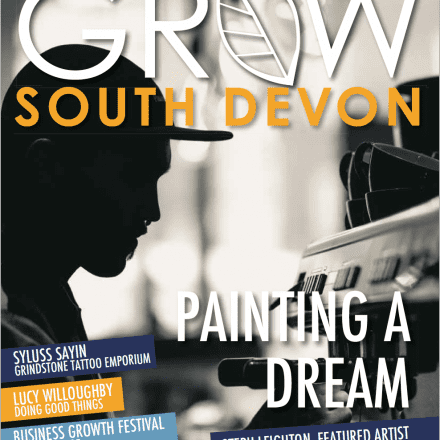
Garry Mackay – LAW FOR THE REAL WORLD
Written by Joff Alexander-Frye, Photography by Pip Andersen
If you ask me, lawyers are some of the most caricatured, pigeon-holed and misunderstood professionals in business today. Whether it is the outdated reputation of years gone by, or the challenging task of how to keep up with the fast-shifting sands of the modern business world, firms of solicitors are having to wise up quickly, particularly in terms of how they communicate their corporate identity and personality.
So, when I went to meet with Garry Mackay (C.E.O of the award-winning firm Ashfords Solicitors), I was excited to hear about a man and a firm who are well known locally, regionally and even nationally for their personal and bespoke approach to legal services.
Based in their impressive custom-designed building (one of the first buildings you see when you exit the M5 towards Exeter), Garry, Pip Andersen (one of our amazing photographers) and I settled into a meeting room to talk about his journey, the Ashfords brand and how they have focused on, and communicated, their vision and cultural values.
Hi Garry. Thanks for fitting me into your busy schedule today. Let’s start by talking a little about your background and career to date?
Yes, good morning Joff. A pleasure to have you here for a couple of hours. Well, where do I start? I’m a Stoke-on-Trent boy, born and bred. I’m also a Stoke City fan (for my sins) and this season really hasn’t panned out too well.
Yes, the less said about that the better probably.
Indeed. Having grown up in North Staffordshire, I took on my first major role working for Alton Towers Theme Park as a Computer Programmer and Systems Analyst. It was here that, along with a couple of other colleagues, I designed and implemented what was, at the time, Europe’s largest Electronic Point of Sale (EPOS) network.
I’ve always been fascinated by technology and, especially, how businesses can implement and leverage it to benefit their causes. For example, when working in-house at Alton Towers, I developed computer programmes which helped us to analyse and strategise within our restaurants. We could work out what times of day staffing levels needed to increase or decrease, what sorts of food were being ordered more than others and so on.
The analysis of this data also allowed us to assess what age groups, genders and socio-economic demographics of visitors were more likely to purchase different items within the park. We were then able to make more educated business decisions accordingly. The use and analysis of data is vital in the modern business world.
Quite right Garry and Exeter is becoming more of a hub for this type of activity. With organisations like the MET Office basing themselves in the city, the ‘Big Data’ sector is really growing fast in and around Exeter. So, how did you transition from that role to working in the legal sector?
Well, after a year working in the U.S with disabled children, I moved back to the U.K and didn’t have a clear path ahead of me in terms of career. I started a history degree at university and, part of the way through that course, started an external course in Law, which I took to very quickly and really enjoyed. So much so, in fact, that I swapped onto a law degree. Once I had graduated, I was on the lookout for my first job as a lawyer and some of the big offers from London and Birmingham just didn’t appeal to me. In the end, I was offered a trainee contract at what was called Bevan Ashford at the time and moved down to Exeter in 1996.
After completing that contract, I moved to Foot Anstey where I set up their I.T offering along with a chap called Ed Probert, before moving back to Bevan Ashford, which then became Ashfords, where I started to explore my love for law and technology in real earnest. It was sort of a merging of interests and expertise and I haven’t looked back since, moving through fee earning, management and partnership positions until, about five years ago, I took on a Joint CEO role. Then about three years ago I took on the role of sole CEO.
So, having been in Exeter for 22 years, I imagine that you have observed a great deal of change. In the city itself, in your industry and in your specialism of technology?
Yes, an incredible amount. This firm, the city of Exeter and the Westcountry, in general, are almost unrecognisable compared to two decades ago. And, on the whole, these changes have been hugely positive. I know some people will have a grumble about particular issues that have come along with these changes, but when you look at the opportunity, growth and development of the city and region, they have been hugely positive changes overall.
I’ve only lived in Devon for thirteen years, so I’m still a newbie really! Talk me through some of the things that come to mind when you think of that change that has occurred?
Well, clearly the city has changed a lot in terms of infrastructure, inward investment and pioneering new ventures. In recent times, of course, there has been great expansion in the Sciences and Technology. With organisations like the Science Park and Exeter City Futures doing their thing, the city is starting to become a hub for innovation and tech-based industry. Also, attracting the MET Office and the expansion of Flybe’s head office are just two examples of local projects that have been crucial to consolidating the growth story of Exeter. There is still so much work to do though and, both personally and as a firm, the development and investment around the local tech offering is a huge priority. It should be one of the city’s highest priorities too.
Can you tell me at all about what that focus and investment will look like for Ashfords?
Well, we’re a slightly unusual firm in that we have a lot of non-legal businesses that we own. Just to name a few, we have a joint venture which offers Contract Management and Data Room Systems, as well as several brand new digital innovations, including our new digital legacy offering and also an industry-leading online dispute resolution platform. These are just a few examples of the types of uses that we are finding for technology within our business portfolio.
And how about the changes that you have observed within that twenty-two-year period within your firm?
When you look at our firm in singularity, we are significantly larger than in years gone by (whether before the de-merger or afterwards). In day-to-day working life, progressing from typewriters (which we used when I first joined the firm) to the always-connected, multi-device and mobile workforce that we now have has meant that our work environment has changed remarkably. One thing that hasn’t changed though is the culture of our firm. We have always been a really nice place to work and, although you think that I have to say that, it has been proven time and time again, both anecdotally and through staff surveys.
It might seem a small thing, but we choose not to wear ties within the firm. After all, our physical appearance isn’t what makes us good lawyers but, rather, the service we offer our clients. Trying to move people’s focuses onto what we do rather than how we appear has been a really important piece of work for our firm. After all, what we do and the way that we do it is the only real thing that can set us apart from our competitors.
Also, another seemingly small thing, but, thanks to our investment in technology and focus on making our firm more environmentally friendly, we have an almost paperless office now. Things like this make a real difference in the day-to-day feel of the firm.
On a more fundamental scale, our partners have taken a stance that we want to be as transparent as possible. To my knowledge, we are the only law firm in the area who have revealed gender pay data across all levels of the firm, including at partner level. We didn’t have to do that but we wanted to disclose the true position of where things currently are so that we know what work needs to be done.
That’s refreshing Garry. Talk to me a little more about the Ashfords culture?
We have created a laid-back atmosphere within our teams and talk often about wanting to be ‘lawyers for the real world’ rather than the stuffy perception that some people have of lawyers. From feedback that we have sought from our clients, we are perceived as being commercially-minded and willing to roll up our sleeves and get our hands dirty. We are committed to centring our approach around the needs of our clients and we work hard to combine our legal expertise, our real-world experience and our wider connections to help people achieve their goals. Above all, we aim to make the experience of working with Ashfords something that our clients will always value.
To give particular examples of our internal culture though, we have a vast array of activities which staff do together (some on-site and some in an extra-curricular capacity). From on-site yoga lessons, exercise classes and table-tennis tournaments to organising away days and team-building exercises, we try to invest in the wellbeing of our staff in any way possible. We invite all of our associates to our Partners Weekend each year too, to make it more open and inclusive.
We also organise a Summer party each year for all employees across our six U.K offices. It is usually held in the South West and we ship employees in from around the U.K for an annual shindig. This year’s is at Exeter Cathedral, so five hundred and fifty of us will descend on the Cathedral in a few months’ time. I’m looking forward to it, although I usually last until about 11pm and then leave the real party animals to it!
And, perhaps, you could talk a little about how this culture has educated your company values?
We have just completed a rigorous internal review and subsequent external rebrand. The centre-piece of this process was a conversation about defining the most important values which our organisation and our people will use to filter their behaviour, decisions and priorities. Our workforce is wonderfully diverse and, whilst we cherish their individuality, hopefully, anyone who deals with our firm will detect the same four common values in what we do and say. These are to conduct rewarding relationships, have open minds, offer technical excellence and remain results-focused.
It is impossible to expand on these in a meaningful way within my short conversation with you, but these each mean something important and particular to our organisation and the people within it. I film a monthly CEO video which is sent to all staff as well as doing a ‘state of the union address’ each year in person to all staff. These are the values that I will reflect on and measure against during such communications. It gives us some tangible measurability for our cultural performance.
Also, we recruit with culture and values very much at the forefront of our minds. Someone’s ability to fit into our organisation is of vital importance to us, not just their skill set, experience or qualification.
I’d be lying to say that there aren’t challenges involved with all of that though. The larger the organisation becomes, the more challenging it is to set, maintain and measure cultural performance. Every bit of training and marketing that we carry out has culture and values at the heart of it. Indeed, our whole strategic direction has been built with culture in mind and we commonly ask ourselves whether decisions will impact or endanger the culture that we have fought hard to carve out. We’re by no means perfect as an organisation but we are committed to improving in any and every way possible.
No-one is Garry, but you are certainly walking the walk in terms of your commitment to creating a positive and unique company culture. Finally, could you could give me your elevator pitch in terms of the vision for the future at Ashfords?
Put bluntly, our aim is to continue to be the best law firm in the South West. We want to do the right things for the right reasons and allow any accolades, awards or successes to come naturally as a result of that.
Specifically, we want to increasingly do national and international business as a firm. Something that most people don’t know about us is that our primary revenue-generating offices are based in the South West. Even two thirds of the work secured in our London office is carried out in the South West. If you think about it, a lot of the most experienced lawyers do their stint in London and then move down to the South West, meaning that we have an incredibly rich pool of talent in our Exeter and Bristol offices.
So, we plan to expand geographically, whilst continuing to create a long-term sustainable business, with a healthy culture and a productive and satisfied workforce.
To that end Garry, I wish you all the best and look forward to seeing Ashfords continue to make a difference locally, regionally, nationally and internationally.
Follow the progress of Ashfords on Twitter @Ashfords_Law










